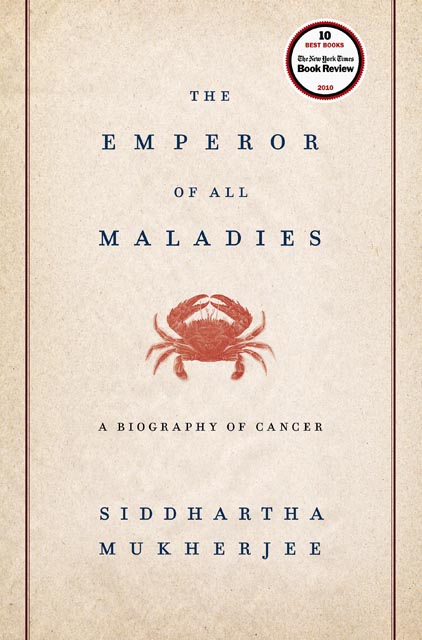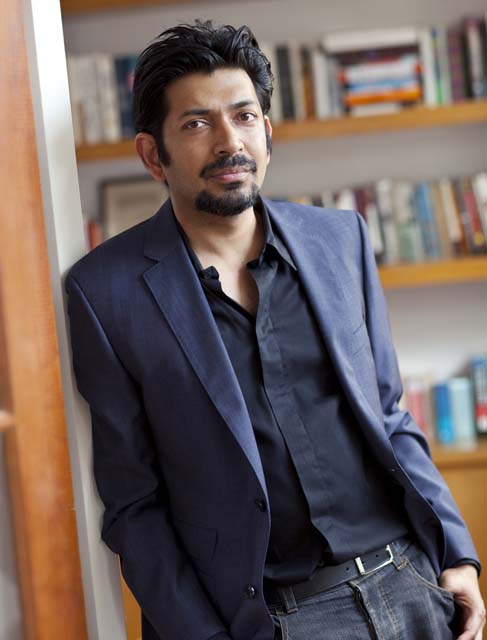
Siddhartha Mukherjee – Fighting Cancer
It’s a battle between one man and a many-headed monster. In his Pulitzer Prize winning debut book, ‘The Emperor of All Maladies’, Dr. Siddhartha Mukherjee takes on a formidable foe – cancer. In his words, it is “a lethal shape-shifting entity imbued with such penetrating metaphorical, medical, scientific, and political potency” that it continues to outwit the world.
As The New York Times wrote, “He frames it as a biography, ‘an attempt to enter the mind of this immortal illness, to understand its personality, to demystify its behavior.’ It is an epic story that he seems compelled to tell, the way a passionate young priest might attempt a biography of Satan.”
Mukherjee’s book, a decade in the making, delves deep into cancer’s past, reconstructing its psyche, probing into the many real life characters who have waged the war against this baffling disease for 4000 years, from the ancients to early heroes like chemo-therapist Sidney Farber and socialite Mary Laskey to his own patients. The book, which is 600 pages, originally started out at 1800 pages as he excavated cancer’s past, doggedly following all leads, and even turning detective.
He recalled recently how he traced a cancer survivor through Internet comments and Facebook, taking a bus and car to reach her doorstep in Maine. When she asked him ‘Why have you come?’ he says, “I couldn’t explain it to her. I said, ‘If you weren’t there, if I hadn’t found you, I wouldn’t be able to write this book. You see, you are my book.”
What Mukherjee had started as a journal for a year at the Dana-Farber Cancer Institute and Massachusetts General Hospital in Boston has turned into this massive odyssey of cancer. Mukherjee calls it “a larger exploratory journey that carried me into the depths not only of science and medicine, but of culture, history, literature, and politics, into cancer’s past and into its future.”
Such is the power of this inscrutable disease that both physician and patient are pulled into its spinning vortex. Writes Mukherjee, “Immersed in the day-to-day management of cancer, I could only see the lives and fates of my patients played out in color-saturated detail, like a television with the contrast turned too high. I could not pan back from the screen. I knew instinctively that these experiences were part of a much larger battle against cancer, but its contours lay far outside my reach.”
In attempting a biography of cancer, Mukherjee takes on its past to explain its present. “The isolation and rage of a thirty-six year old woman with Stage 111 breast cancer had ancient echoes in Tossa, the Persian queen who swaddled her cancer-affected breast in cloth to hide it, and then, in a fit of nihilistic and prescient fury, had a slave cut it off with a knife.”

The Emperor of All Maladies:
Greek tragedy, suspense novel & Dickensian melodrama rolled into one
The book is about cancer but this is no dry text book. Listen to Mukherjee describe something as prosaic as the cancer genome: “The language of cancer is grammatical, methodical, and even – I hesitate to write – quite beautiful. Genes talk to genes and pathways to pathways in perfect pitch, producing a familiar yet foreign music that rolls faster and faster into a lethal rhythm. Underneath what might seem like overwhelming diversity is a deep genetic unity. Cancers that look vastly unlike each other superficially often have the same or similar pathways unhinged.”
This remarkable book which sometimes reads like Greek tragedy, suspense novel and Dickinsian melodrama all rolled into one, won the Pulitzer Prize for non-fiction, among a gaggle of other awards and honors. It was among the top ten books on Oprah magazine, The New York Times and Time magazine. In 2011, Mukherjee was among Time’s Top 100 Influential People. This leading researcher and oncologist is suddenly the publishing world’s blue-eyed boy and in demand, not only by his patients but by book-lovers everywhere, armed with the hefty copies of the book to be autographed.
Siddhartha Mukherjee, 41, is also an assistant professor of medicine at Columbia University and a cancer physician at the CU/NYU Presbyterian Hospital. His educational pedigree is very pretty impressive – he’s a Rhodes Scholar who graduated from Stanford University, University of Oxford and Harvard Business School. He’s been a Fellow at the Dana Farber Cancer Institute and an attending physician at Massachusetts General Hospital and Harvard Business School.
Interestingly enough, there were no writers or physicians in Mukherjee’s family. He grew up in New Delhi where his father Sibeswar Mukherjee worked for Mitsubishi and his mother Chandana was a school teacher. His parents still live in Delhi. “We spoke Bengali and English at home, our house was immersed in books,” he recalls. “I have a very intimate relationship with Bengali literature, particularly Tagore, and I would say my interest besides reading at that point of time in my life was music. And so, my memory of my household is of one immersed in books and music.”
Mukherjee graduated from St. Columbus (actor Shah Rukh Khan was six years his senior). Did he write when he was young? He did but he says he never considered himself a writer. “It is not clear to me that I would treat myself as a writer even now. For me writing is a mechanism by which information really gets moved, transmitted.”

“The Book was a Conversation That Went On in My Head All the Time…” – Siddhartha Mukherjee
Mukherjee is married to Sarah Sze, a MacArthur Genius award-winning sculptor whose work is in major museums from MOMA to the Met. “I have a long-standing interest in the arts so I actually knew Sarah’s work before I knew her,” says Mukherjee. “We were introduced by a common friend who knew I admired her work, so that is how we initially met. What can I tell you about her? Sarah is the brains and soul of our family and she practices a very innovative inventive kind of sculpture that really challenges our perception of what sculpture is, what art is.”
The couple has two daughters, Leela, 5, and Aria, who is 18 months old. As he mentions, the book was ‘a rival sibling’ and the girls often fell asleep to the mechanical lullaby of “my furious typing and then awoke the next morning to find me typing again.”
The book, like the powerful disease it pursues, took over Mukherjee’s life completely. “I was thinking about it constantly. I mean the book was like a conversation that went on in my head all the time.”
Now that the book is done, what’s a typical day like?
“My day is very unstructured and I like to leave it unstructured,” he says. “One day of the week I see patients, the rest of the week is very unstructured. I run a laboratory and I try to focus on that, but I try to keep it very unstructured so that I can move in a more flexible manner between doing laboratory research, between doing writing, and doing scientific writing.”
Is there another book in the works? Says Mukherjee, “I am working on one but it’s too early to talk about. When I write a book most of the time is spent thinking and only some of it is spent in writing it. So when I would have a little bit more sense of it, I will let you know!” And add one more item to an incredibly busy life: Mukherjee is collaborating with Standup to Cancer which is making a documentary based on ‘The Emperor of All Maladies.”
It is hard to imagine that Siddhartha Mukherjee has any time left over for leisure activities, and he cites his passion for reading and art, and says the conversations at home are often about science and art. “I find the boundary between what work is and what leisure is quite difficult to understand anyway,” he says. One wonders what the possibilities are for Leela and Aria, growing up surrounded by an abundance of arts and science. Siddhartha Mukherjee smiles, “Well, they are going to teach us about something else, I think!”
© Lavina Melwani
(This article first appeared in Hi Blitz)
The Writer-Doctors Series:
Siddhartha Mukherjee-Battling the Emperor
Sanjay Gupta, CNN”s Doctor to the World
Atul Gawande – A Checklist for Success
Abraham Verghese – The Healing Touchstone
Sandeep Jauhar – The Human Factor

2 Comments
Thank you Elizabeth – this was one of the most compelling books I’ve read. I hope to read and review The Gene soon.
What an articulate review, and a fine tribute to some of the best prose I’ve read in … oh… I don’t know… decades? Ever? Have you reviewed The Gene yet ? You must, please!